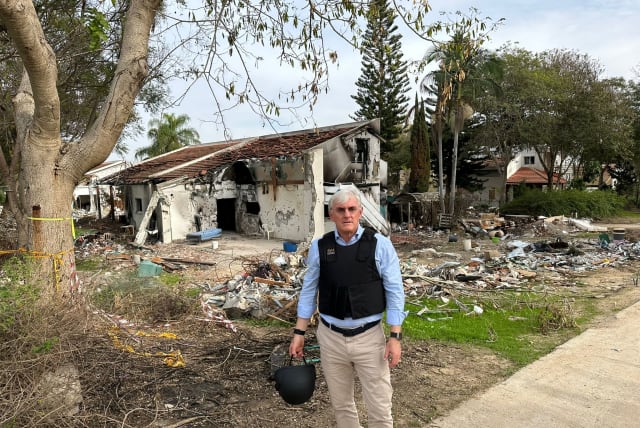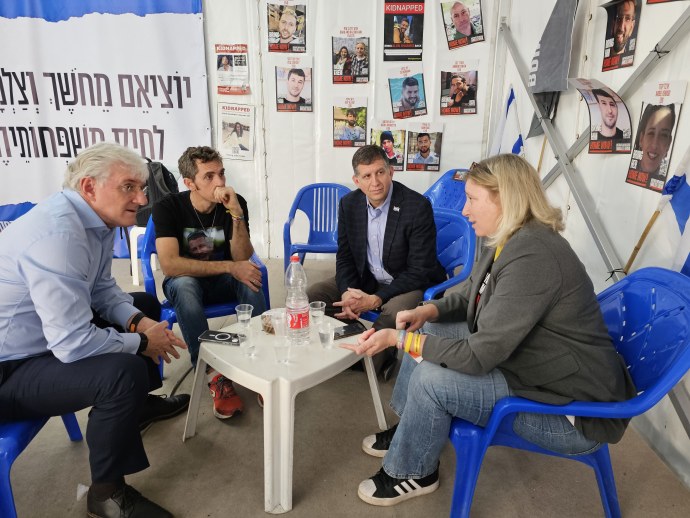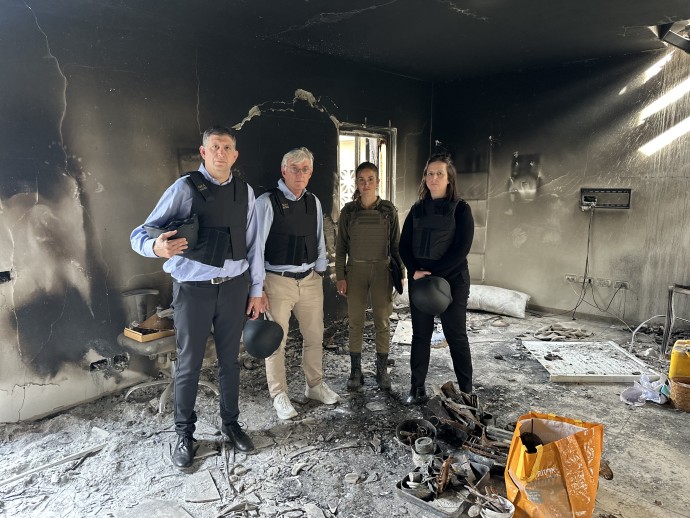Keren Hayesod chief on the ground in Israel

Steven Lowy, chairman of the World Board of Trustees of Keren Hayesod, visited the Gaza envelope this week.
On Oct. 7, chairman of the World Board of Trustees of Keren Hayesod Steven Lowy was in New York. Waking up that morning, he recalls looking at his phone and seeing messages from Sam Grundwerg, the world chairman of Keren Hayesod.
“Sam is observant, and I have never spoken with him on a Shabbat or Jewish holiday,” says Lowy.
Lowy knew that something was awry. He turned on the news and learned of the dramatic developments in Israel, and by mid-day in New York, a coordinating meeting between the leadership of the Jewish Agency, Keren Hayesod, and the Jewish Federations of North America was underway.
“We were in action within hours,” says Lowy. Over the next few weeks, the heads of the three organizations met practically daily. In addition to working in this group, Lowy and Grundwerg and CEO and director-general Edna Weinstock Gabay coordinated the efforts of Keren Hayesod across 45 countries and in 60 separate worldwide campaigns.
“It was an unfolding experience that I will never forget,” says Lowy.
A week later, Lowy, who lives in Sydney, Australia, was still visiting family in New York. Together with other Keren Hayesod leaders, he made the decision to be on the ground in Israel on a visit extending support and expressing solidarity.
Lowy flew to Israel along with other members of Keren Hayesod’s Board of Directors and visited the Gaza border communities. At that time, the army was not allowing visits to the actual kibbutzim, so Lowy and the delegation spent their time in the area, consoling and speaking with grieving families – and visiting the wounded at Barzilai Medical Center in Ashkelon.
“We did what we needed to do to get a clear understanding of the combination of the sadness that Israel has gone through but also the strength and unity that was occurring within Israel and the Diaspora.” Lowy and the Keren Hayesod delegation met with President Isaac Herzog during the visit. He says that the trip was “one of the most moving few days of my life.”
While they were unable to visit the kibbutzim and moshavim, they did meet with the heads of five of the local municipalities. “It was unbelievably moving,” he reports. “Many of these leaders had lost family and friends, and they themselves were personally involved in fighting the terrorists. Through us, they appealed to the Diaspora to be with them in their hour of need.”
The delegation attended the funeral of Ofir Libstein, head of the Sha’ar Hanegev Regional Council, who was murdered by Hamas terrorists on the morning of Oct. 7. They also paid condolence calls to many families, including the family of a lone soldier from England.
“It is unusual to pay a shiva [mourning] visit to someone you never met, but it was more like a visit from friends or family. It was moving for both sides.” Lowy recalls the visit as being very raw, at a time when the country was still in shock.
“Now, I am privileged to visit these sad places and see what we can do to assist those communities, to help them rebuild, and share with the many thousands of Keren Hayesod supporters around the world.”
He points out that the events of Oct. 7 have impacted not only Israel but the Jewish world as a whole.
“Obviously, Israel is at war,” he says, “but I would have to say that the Jewish people and Diaspora communities are in a type of war as well. The rise in antisemitism, the disturbing events in cities around the world, and the work of local Jewish communities to maintain political support for Israel is a war that is taking place right now.”
Referring to his visit to the Gaza border communities in early October, Lowy confesses that he felt safer there – even with the rockets flying overhead – than he did in Sydney, where the Israeli flag was burned in front of the Opera House.
Having set an initial fundraising goal for Keren Hayesod of $100 million, Lowy is justifiably proud that the organization has already raised $175 million. This emergency sum is above and beyond the regular monies raised through Keren Hayesod in its three main areas: aliyah; assisting the disadvantaged in the country’s periphery; and maintaining and strengthening the connection between Israel and the Diaspora through programs such as Masa.
He adds that the importance of organizations such as Keren Hayesod, which has been in existence for 103 years, transcends their financial significance.
“We are still as relevant today as we have ever been in the connection between the Diaspora and Israel. Out of the tragedy and the sadness, the unity that’s within the Diaspora and toward Israel is remarkable. I am 61 years old, and I haven’t seen it in my lifetime.”
Lowy discussed the emergency assistance that Keren Hayesod is providing at this time together with its strategic partner and sister national institution, the Jewish Agency for Israel.
For the last 21 years, Keren Hayesod has been a major funder of the Jewish Agency’s Victims of Terror Fund, which has assisted thousands of people over the past two decades. This fund is helping the many people who need assistance due to the Oct. 7 massacre and its aftermath. Keren Hayesod has also provided emergency aid to several hospitals and to local municipalities in Israel’s South and North. Additionally, he says, Keren Hayesod will provide long-term trauma and resilience support and help rebuild the southern communities that were destroyed.
Lowy adds that Keren Hayesod is also a major vehicle for support from Christian friends of Israel worldwide, including Latin America and parts of Asia and Europe. “It has become a very important source of solidarity and financial assistance,” he says.
During his current trip over the last few days, his second to Israel since the events of Oct. 7, Lowy visited Hostages Square in Tel Aviv with Grundberg, and they met with several family members of the hostages to identify with their pain and to show support.
“It’s horrific,” he says. “It’s one thing seeing pictures of those kidnapped and a name; but it’s another thing meeting with the families and hearing their personal stories and being able to hug them. It’s like your own family, and it shows the uniqueness of our people. Even if you’ve never met them before, you have a sensitivity to what they are going through, and the unity and solidarity that comes with that from both sides are critical. I believe that Israel is feeling embraced, and Israelis are very much feeling embraced by their brothers and sisters around the world.”
The antisemitism that has exploded around the world, says Lowy, particularly that which has come from his homeland Australia, is disturbing. Referring to the anti-Israel protest at the Sydney Opera House, in which protesters shouted, “Gas the Jews,” Lowy says that events like that are unacceptable.
“Australia, like the United States, is built on values of fairness and freedom. Australia absorbed massive amounts of immigration of people fleeing antisemitism, like my father.”
In attempting to understand how antisemitism has proliferated over the past few months and how Hamas has attracted followers in the West, Lowy says that it is sad to see.
“How can anyone not condemn Hamas and the brutality of their actions?”
He points out that the people who are antisemitic and don’t want the Jews to exist are in a minority but have a high profile and make sure that their views are heard.
Lowy explains that while the majority of politicians in Australia support Israel’s right to exist, the local Jewish communities have nevertheless made major upgrades to their security. All four main Jewish schools in Sydney, the synagogues, and the Jewish museum have armed guards and local Jewish security.
He points out that the worldwide Jewish population is only around 15 million, and many people know very little about the Jews.
“There are 100,000 Jews in Australia, which is one-half of one percent of the country’s population. There are many Australians who have never even met a Jew,” he says.
The unfamiliarity with major historical events, such as the Holocaust, indicates a weakness in the educational system, internationally, which needs to be repaired. The simplistic language of labeling Israel an “oppressor” influences people, and the impact of social media, with its focus on sound bites rather than facts, cannot be overlooked, he says.
Lowy feels that Israel is doing a much better job of telling its side of the story than it has in the past, praising the on-air advocacy of Mark Regev, Peter Lerner, and Eylon Levy, among others, who “speak firmly yet calmly and push back with facts and discipline.”
He says, “Israel has learned how to put its point of view across in the face of one-sided questioning.” Earlier this week, Grundwerg, Weinstock Gabay, and Lowy visited Kibbutz Be’eri and Kibbutz Kfar Aza to see the devastation firsthand and to learn more about the needs of the residents and the area.
Despite the destruction and trauma, he says, many of the residents are ready to return and rebuild their homes.Lowy sums up his role as a leading light in the Diaspora community: “I see two responsibilities: making sure that the community is as strong as possible; and making sure that the support for Israel is as strong as possible.”
This article was written in cooperation with Keren Hayesod.
Jerusalem Post Store
`; document.getElementById("linkPremium").innerHTML = cont; var divWithLink = document.getElementById("premium-link"); if (divWithLink !== null && divWithLink !== 'undefined') { divWithLink.style.border = "solid 1px #cb0f3e"; divWithLink.style.textAlign = "center"; divWithLink.style.marginBottom = "15px"; divWithLink.style.marginTop = "15px"; divWithLink.style.width = "100%"; divWithLink.style.backgroundColor = "#122952"; divWithLink.style.color = "#ffffff"; divWithLink.style.lineHeight = "1.5"; } } (function (v, i) { });


